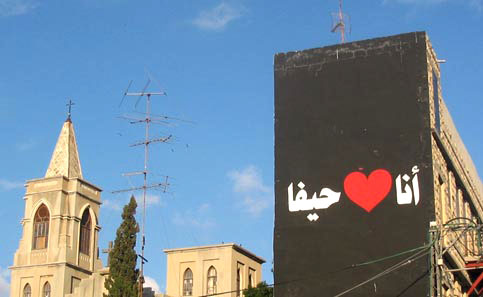- Al Jazeera English. By Jonathan Cook in Nazareth

- “I love Haifa” on a wall of a building block in Haifa. (Palestine Remembered)
This year’s US State Department annual report on human rights practices in Israel identifies discrimination against Palestinian citizens in most spheres of their lives.
It says: “The government did little to reduce institutional, legal, and societal discrimination against the country’s Arab citizens.”
Among many issues, it notes the humiliating treatment of Palestinian citizens, including community leaders, during security checks at airports and checkpoints.
Last month, Amir Makhul, director of Ittijah, the umbrella organisation for Israel’s Arab non-profit groups, was detained at length and searched by security staff at Ben Gurion airport.
The report’s other criticisms confirm a picture that has been familiar from a spate of human rights reports.
In 2001, Human Rights Watch published a comprehensive report into the separate education services offered to the Palestinian minority.
It found systematic discrimination: in the number, quality and condition of buildings; in classroom sizes and the provision of teaching resources; in funding by the government; and in developing the curriculum.
It reserved its harshest criticism for the dire state of special education for disabled Arab children.
Inequality
Israel has also sought to undermine the value of Arabic, even though it is an official language of the state. Few Jews learn even basic Arabic, whereas Arab children are required to learn Hebrew to advanced level.
University courses are in Hebrew or English, as are public meetings and court cases. Many Arab workers report being sacked for speaking Arabic at the workplace.
Much international attention has focused on the recent decision by the Knesset to ban family unification in the case of marriages between Israeli Arabs and Palestinians from the West Bank and Gaza.
In many cases, it is now impossible for couples to live together: under the new law, Palestinians are denied entry into Israel, while Israeli Arabs are banned by military orders from entering Palestinian areas.
Deprivation
Economically, the Palestinian minority have been suffering the brunt of Israel’s recession. The worst 36 unemployment blackspots in Israel are all Arab localities.
Despite the manipulation of the jobless figures, unemployment among Israeli Arabs is twice that of Jews.
The country’s big monopoly corporations such as the telecoms firm Bezeq and the Israel Electricity Company have Arab employees in the single figures even though they have a combined staff of more than 20,000.
Some of the worst discrimination is faced by the 140,000 beduin living in the Negev. Many of their communities have never been recognised by Israel, even though they predate the state.
Consequently, some 70,000 inhabitants have been forced to live in tin shacks or tents, without electricity, water or sewage services, and any municipal services. Young children often have to travel dozens of miles to reach a school.
Victimization
As part of an attempt by the government to force the beduin off their historic farming lands and into planned urban reservations – to make way for Jewish communities and wealthy Jewish farmers – the government has repeatedly sent in planes to spray beduin crops with herbicides.
It has also demolished mosques in the Negev, in line with a long-standing policy of denying state recognition to hundreds of holy places for Christians and Muslims that predate the creation of the Israeli state in 1948.
Much of the debate in the Israeli media about the Palestinian minority concentrates on the “demographic threat” Arab citizens pose to the existence of Israel as a Jewish state.
In 2002, the government set up a Demography Council of Jewish academics, lawyers and gynaecologists to devise ways to increase the birth rate of the Jewish population and dissuade Arabs from having large families.
Removal of child benefits for Arabs have been top of the political agenda ever since.
Racism
In the past week, transport minister Avigdor Lieberman called for the expulsion of the “Arabs of Israel” on Army Radio. It was not the first time he, and other ministers, had made such racist remarks.
Demographic warnings have also been heard from the very top, including a speech in December by the treasury minister Binyamin Netanyahu. He observed: “If there is a demographic problem, and there is, it is with the Israeli Arabs who will remain Israeli citizens.”
The minority’s own political representatives have been effectively neutered. None of the Arab parties has ever been allowed to join a coalition government. Their voices have been entirely absent from the decision-making process unless they join Zionist parties.
Campaign
Worse than this, a relentless campaign to discredit and intimidate outspoken Arab politicians has been waged by the government, with almost no scrutiny from the Israeli media.
The secular nationalist Azmi Bishara has been stripped of his parliamentary immunity and put on trial for speaking out against the occupation.
The spiritual leader Shaikh Raid Salah has been in jail awaiting trial for the past year, originally on charges of supporting terror. It was soon clear there was no basis for the accusation, which has been scaled down to claims of financial irregularities by his Islamic Movement.
And four leaders of Ibn al-Balad, a party that seeks a one-state solution, were arrested in February and have since been held in administrative detention without access to lawyers.
The HRA report on police brutality is available HERE.


